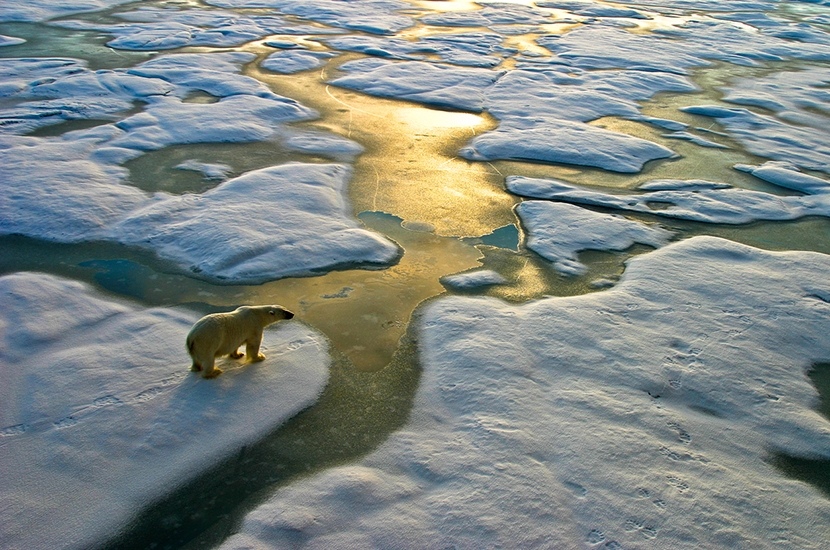It may be time for Santa Claus to look for a new home, before the Russians kick him out. ‘This is our Arctic,’ declared the Russian explorer Artur Chilingarov when he went to the North Pole in 2003. Four years later, another Russian expedition, again led by Chilingarov, planted a titanium flag on the seabed 2.5 miles below the Pole. It was a symbolic gesture of a geopolitical ambition. The jingoistic Chilingarov proclaimed: ‘Our task is to remind the world that Russia is a great Arctic and scientific power.’
Since 2013, Russia has invested heavily in seven military/naval bases along its Arctic coast to strengthen the country’s power and influence. ‘The Americans think that only [they] can…make the rules,’ foreign minister Sergei Lavrov stated. ‘In terms of the NSR [Northern Sea Route], this is our national transport artery.’ Last month, barely reported by western media, President Vladimir Putin, at a ceremony in St Petersburg’s Admiralty shipyard, unveiled a new diesel-electric icebreaker ship, the Viktor Chernomyrdin, the most powerful non-nuclear vessel of its type in the world. Just a month earlier, another new icebreaker, the Arktika, a 33,000-ton nuclear-powered ship with the displacement of a World War Two aircraft carrier, began operations in the Arctic. Its bows can crash through ice 10ft thick.
Future plans include three ‘Leader Class’ 70,000-ton behemoths to add to the roster of 37 large icebreakers. It is a force that supports the Northern Fleet, based near the city of Murmansk off the Barents Sea, which musters an impressive 35 surface vessels and the same number of submarines.
The Russian Arctic with its 15,000 miles of coastline, home to two million people, was of dubious value until recently. Global warming has changed that. According to the 2014 report by the Intergovernmental Panel on Climate Change, Arctic ice volumes have decreased by 75 percent since 1980 and large swaths of the Arctic Ocean could be ice-free within a generation. For North Asian countries, a sea route along Russia’s Arctic would cut shipping times to Europe by weeks. Even more importantly, the Arctic Ocean, 3 percent of the world’s surface — about the same as mainland Russia — is estimated to contain 22 percent of the Earth’s oil and natural gas as well as copious quantities of minerals. While the international community signals its global warming credentials, many countries will put Arctic exploitation above ecological interests.
Allocation of these exploitation rights is a hot topic. While the United Nations Convention on the Law of the Sea (UNCLOS) allows the littoral Arctic Council countries — Canada, Denmark via Greenland, Norway, Russia and the United States — to extend their territorial waters 200 miles from shoreline, beyond that point there is ample scope for disagreement, and not just about boundaries. If a country can prove a ‘continental margin’ — a shallow shelf linked to the mainland — then an exclusive Economic Extension Zone (EEZ) can be established up to 350 miles from the shore. Russia, Canada and Denmark all lay claim to the Lomonosov Ridge, a 1,100-mile-long underwater mountain range that splits the Arctic in two.
A further area of contention is ‘passage rights’. UNCLOS provides all nations with the right to use territorial waters for passage but this does not apply to internal waters. Russia currently treats its Northern Sea Route as internal and charges passage fees accordingly. It could, by its own interpretation of UNCLOS, block access at any time.
So far the American response to Russia’s proprietorial claims has been dilatory. It was only in 2018, after a 30-year hiatus, that the US ventured to send a surface fleet to the Arctic led by the carrier USS Harry S.Truman. However, American resources in the area are threadbare. Although Congress approved the building of a new $655 million icebreaker last year, its current coastguard capacity in the Arctic is a single heavy icebreaker, the 43-year-old Polar Star.
Nevertheless, secretary of state Mike Pompeo is well aware of the economic potential of the Arctic, as he made clear on a visit to Finland in May 2019. However, with the election of Joe Biden as President, the Trump-Pompeo attempt to revitalize US economic interest and military strength in the Arctic is likely to be short-lived. Congress, despite the entreaties of Presidents Bush and Obama, refused to ratify UNCLOS and has so far excluded the US from the possibility of extending its EEZ — at least by international law. But the economic benefits to the US could in any case be moot.
In December 2016, the departing President Obama and Canadian Prime Minister Justin Trudeau concocted an accord to prevent Alaskan drilling indefinitely. The aim was to thwart the pro-oil presidency of Donald Trump. In March 2019, Trump’s attempt to lift the Obama ban was judged unlawful by a federal court. As with Obama, Biden’s strategy in the area can be expected to draw heavily on the weasel words ‘sustainable’ and ‘responsible’ — in short, no geopolitical strategy at all. It seems probable that Biden will give up the contest for the Arctic as easily as Obama gave up control of the South China Sea.
As for Europe, it has skin in the game through Denmark’s sovereign rights over Greenland. Although Denmark has increased its naval budget, it is a drop in the Arctic Ocean compared to Russia’s. Given that, at 1.3 percent of GDP, Danish military spending falls way short of its Nato commitments, Prime Minister Mette Frederiksen’s tart response to Trump’s suggested purchase of Greenland was foolhardy. Trump promptly canceled his scheduled Danish visit. No bets as to which global power Frederiksen will depend on if Russia threatens its Arctic rights. For sure it will not be the EU.
The EU, unlike India and China, cannot even get an observer seat on the Arctic Council, seemingly because Canada has vetoed its application owing to Europe’s embargo on seal skins.
[special_offer]
Fortunately, you might think, China is not an Arctic nation. Or is it? In 2018 China made the very postmodern claim to be a ‘near Arctic’ nation in spite of being nowhere near the Arctic — 900 miles, to be precise. As an early signatory to the Treaty of Svalbard (1925), China claims the same rights as Norway to exploit the resources of the Norwegian-controlled Svalbard archipelago. China further argues that UNCLOS, which it has ratified, gives it rights over the ‘Arctic Belt and Road’. Chinese investments in Greenland now account for 12 percent of its GDP, while Finland and Iceland are being similarly embraced. China denies expansionary intent, but in 2010 the Chinese Rear Admiral Yin Zhuo alarmingly claimed that: ‘The Arctic belongs to all the people around the world, so no nation has sovereignty over it…China must play an indispensable role in Arctic exploration as we have one-fifth of the world’s population.’
Is Russia worried? Probably. But its bid to control the Arctic depends heavily on Chinese finance. Needs must. The likely future was signposted when the Silk Road Fund and China National Petroleum took a 30 percent stake in Yamal LNG, one of the world’s largest liquid natural gas projects. Europe may think of the Arctic as a polar bear sanctuary, but bigger players do not agree.
Meanwhile, in the UK the government seems more intent on discussing Scotch eggs and preventing the playing of Christmas board games than stopping a Russian takeover of the Arctic. The BBC’s lack of interest in geopolitics is equally scary. In spite of its 2,000 journalists and 41 international bureaus, it made no mention of the commissioning of Russia’s new icebreakers. Two months ago, by contrast, the BBC website displayed a photograph of a cute, 18-year-old Greta Thunberg acolyte posing with a climate-change placard on an iceberg. For the Beeb, it seems, the Arctic is only an ecological story — though I suppose Father Christmas and the North Pole might get a look-in over the festive season.
This article was originally published in The Spectator’s UK magazine. Subscribe to the US edition here.


















